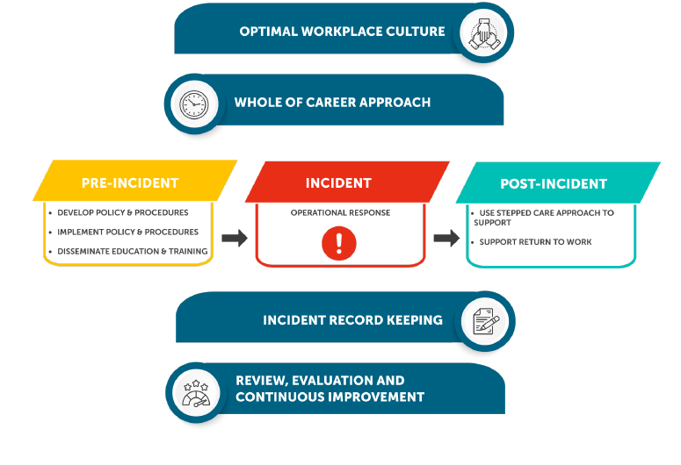Trauma Management
Below you will find information on the trauma that can be experienced by rail workers; common reactions to a potentially traumatic event; where you can get help; and the Rail Industry Trauma Management Framework and Toolkit.
The type, severity and duration of reactions to a potentially traumatic event can vary greatly, depending on the individual and the circumstances in which they experienced the event.
Common reactions in the initial days and weeks following exposure can include:
- Emotions such as feeling tense, easily startled, anxiety, angry, sad, irritable, fearful, guilt, shock, numb, detached, helpless or hopelessness
- Physical changes such as difficulty sleeping, digestive problems, headaches, teeth grinding, aches and pains
- Changes in thinking: reduced concentration and memory, difficulty making decisions, nightmares,
- Behavioural changes including increased alcohol or drug use, risk taking behaviour, reduction in work performance, workplace conflict.
Fortunately most people are resilient and will recover without professional help and with the support of family and friends.
Support is available
Rail employees who need assistance following any type of traumatic event should contact their Employee Assistance Program (EAP) for confidential counselling, their manager or supervisor, a Peer Support worker, their doctor or Lifeline on 13 11 14.
Unfortunately, members of the public may also witness an accident that occurs on the rail network. Information about free confidential support and advice is available here.
Rail Industry Trauma Management Framework
In 2023 TrackSAFE published our updated Rail Industry Trauma Management Framework. The purpose of this Framework is to provide information and guidance to the rail industry on the best – practice approach to trauma management for all rail employees. It is intended to assist provide a uniform approach that can help employers prepare for and minimise the risk of adverse psycho-social outcomes following a potentially traumatic event.
View and download the 2023 Framework here. The print ready version is available here.
The Framework is a guide underpinned by 12 best practice principles (see figure below) derived from research and practice, aligned with the stepped care approach to mental health support. It includes some organisation-wide principles in relation to workplace culture and taking a whole of career approach, not just recruitment.
And then 3 phases:
- what can be done to prepare an individual for a potential exposure,
- what can be done to support them during an event and
- what should be done post incident.
These principles provide a good benchmark to compare organisational policies and procedures – and then make updates to internal documents as necessary.

Toolkit including training to support implementation of the Framework
In July 2023, TrackSAFE surveyed organisations in the rail industry to benchmark organisations against the new Framework. This identified strengths and gaps to inform the development of a Toolkit to support the implementation of the Framework. This will include new training for managers, supervisors, first responders and individuals who may be exposed to potentially traumatic events and information on such things as the development of best practice peer support programs as well as template policies and procedures. These resources will be progressively available during 2024.
If you would like to be kept informed about the release of these resources and join the TrackSAFE trauma management community of practice, please contact us at info@tracksafefoundation.com.au
Check the Training section of this website for more information on the training including ‘train the trainer’ workshop dates.
Further information and resources:
Rail R U OK? provides a range of tips and resources for asking a colleague if they are OK following an incident.
The Lifeline Self-Help Toolkit provides a curated digital library of tools, techniques and information to help individuals understand what they may be going through and learn ways to self-manage their symptoms and seek assistance.
RailRES is a free mobile App to help you manage stress and build long term resilience.
(1) Phoenix Australia 2020, Australian Guidelines for the Prevention and Treatment of Acute Stress Disorder, Posttraumatic Stress Disorder and Complex PTSD
Updated 5 January 2024